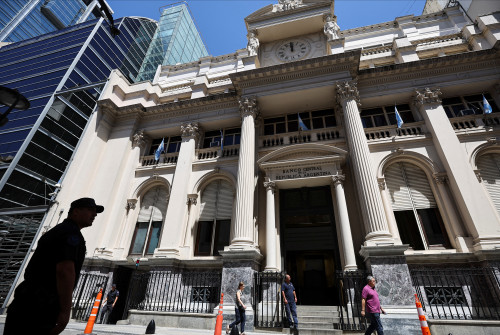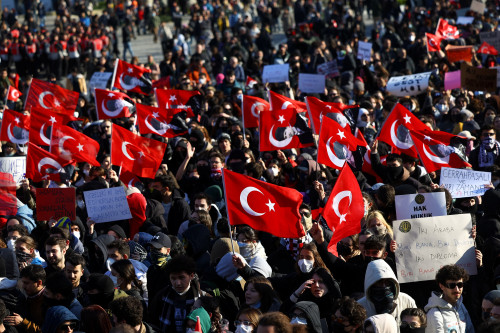ANKARA (Reuters) – The Turkish central bank’s net international reserves dropped some $4.45 billion to a 21-year low of $2.33 billion in the week to May 12, as forex demand surged ahead of elections, official data showed on Thursday.
The bank’s total gross reserves plunged $9 billion in the same week to $105.13 billion, the lowest since July 2022. Bankers and analysts said this underlined authorities’ efforts to stabilise the lira currency.
Forex demand had reached historical highs in the week ahead of presidential and parliamentary elections on May 14, reflecting concerns among companies and individuals that the lira would weaken afterwards, bankers said.
The net forex reserves were at their lowest level since Feb. 2002, after declining in recent years due to costly market interventions and other efforts to cool forex demand.
The net FX reserves have fallen $25.22 billion since the end of 2022. They were last in negative territory in early 2002, a year before Tayyip Erdogan – now facing a presidential runoff on May 28 – was first elected to lead Turkey, then as prime minister.
The exchange rate used by Reuters on Thursday was 19.5389.
The net forex reserves are in deeply negative territory once outstanding swaps, which stood at $36.86 billion on Wednesday, are deducted.
The lira lost some 30% of its value against the dollar last year and 44% in 2021 due to a series of interest rate cuts that are part of Erdogan’s unorthodox economic policies, which prioritise growth, exports and investments.
The data is a very strong indication that the lira is being supported by Turkey’s central bank (CBRT), said Piotr Matys, senior forex analyst at InTouch Capital Markets.
“This incentive is likely to prevail until Turks cast their votes in the second round of presidential elections on May 28,” he said, referring to a runoff between Erdogan and his rival Kemal Kilicdaroglu.
But if Erdogan is re-elected, “investors may start asking themselves whether the CBRT will allow the lira to trade freely, which would most likely result in its sharp depreciation if real interest rates are left deep in negative territory,” Matys said.
The drop in gross reserves, which include gold and forex, has reached $23.6 billion this year as the central bank relaunched gold sales.
Gold reserves have declined some $9 billion to $44.3 billion since the end of March as the central bank sold its reserves to meet domestic demand after gold imports were restricted.
(Reporting by Can Sezer, Ali Kucukgocmen and Nevzat Devranoglu; Editing by Jonathan Spicer and Gareth Jones)





